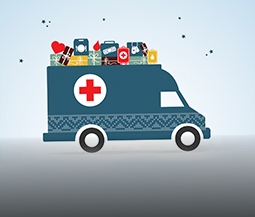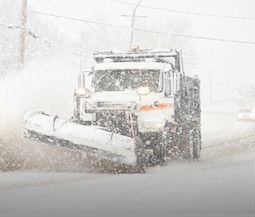Red Cross Societies from around the world are responding on Caribbean islands where Hurricane Irma left behind catastrophic devastation, starting what could become a complex, multi-country relief and recovery effort.
The International Federation of Red Cross and Red Crescent Societies (IFRC) has released emergency funds to ensure a rapid Red Cross response in Antigua and Barbuda, St Kitts and Nevis, the Dominican Republic and Haiti. The American Red Cross has committed $100,000 to assist in meeting the immediate needs of those affected by Hurricane Irma.
Some of the countries responding in the region include the IFRC and the French Red Cross-PIRAC (Regional Intervention Platform for the Americas and the Caribbean), Antigua and Barbuda Red Cross, British Red Cross, Dominican Red Cross Society, Haiti Red Cross Society, Netherlands Red Cross, Saint Kitts and Nevis Red Cross Society, the American Red Cross, the Canadian Red Cross Society, Italian Red Cross, Norwegian Red Cross, Spanish Red Cross, Swiss Red Cross and the International Committee of the Red Cross (ICRC).
Red Cross staff and volunteers are on the ground across the Caribbean. They’re working alongside communities to evacuate people to safe shelters, conduct rapid needs assessments, and provide initial relief and support. Shelter is a major priority, especially on the smaller islands that bore the brunt of Irma’s fury. Water and sanitation are also a major concern.
In Haiti, the American Red Cross prepositioned relief supplies in the northern region of the country in anticipation of Irma’s arrival. Items such as blankets, water and sanitation supplies, tarps, and cooking supplies were shipped and are ready to be distributed. Staff members coordinated with the Haitian Red Cross, Haitian government, and the IFRC to plan for possible response scenarios. Staff warned local populations in the north, where the hurricane was most likely to strike, and are prepared to conduct rapid damage assessments and early relief distributions.
In Panama, the American Red Cross’ regional delegation is providing the IFRC’s Emergency Operations Center with information management support to facilitate coordination and enhance situational awareness.
In addition to supporting Caribbean National Societies, IFRC is working with the British, French, Netherlands and American Red Cross Societies which have territories and overseas branches in several Caribbean islands to coordinate and support preparedness and response efforts. Other partner National Societies are providing support, including staff, to contribute to the response.
SITUATION UPDATE
Major damage has been reported in Antigua and Barbuda, Anguilla, St. Barthelemy, and St. Martin/St. Maarten. In Barbuda, access to the island and its population remains very difficult. Most buildings are destroyed and people are in urgent need of shelter. In St. Kitts and Nevis, there is no electricity. The Islands of St Martin, Anguilla and St. Barthelemy have experienced severe destruction. Assessments are ongoing on each of these islands.
The Dominican Republic and Haiti have been spared the worst of Irma’s impact but continue to be lashed by strong winds and heavy rains. Flooding, including deadly flash flooding is a major concern. The full extent of Irma’s impact on both countries will not be known for several days.
BARBUDA SEES SEVERE IMPACT
“Everything is decimated. Concrete buildings are literally pulled apart, trees that were 200 years old snapped in two. There are empty lots of land where buildings were yesterday, 40 foot containers scattered over the island.”
This is the scene in Barbuda described by Michael Joseph, President of the Antigua and Barbuda Red Cross, where 95 per cent of buildings have been destroyed by Hurricane Irma.
Mandatory evacuation is underway for residents of Barbuda as a second hurricane, Hurricane Jose, looms. Mr. Joseph said that, despite the damage, people are hesitant to leave. “Even people who have lost everything are reluctant to evacuate to the relative safety of Antigua,” he said. “They’re not sure what’s going to happen next, where they are going to stay, if they are going to become a burden. I understand how worrying it is for people, but from a humanitarian perspective I support a mandatory evacuation. There is nothing left in Barbuda – no power, no communication infrastructure, no water. If something were to happen overnight, it would be impossible to assist.”
In the lead up to Hurricane Irma – the strongest Atlantic storm on record – volunteers from the Antigua and Barbuda Red Cross were on the ground providing information on how to be prepared to survive the catastrophic storm.
“In the 48 hours leading up to Hurricane Irma, we were out in communities with flyers and checklists on how to prepare, pushing information through social media,” Michael Joseph said. “We were on TV and radio demonstrating what to take in grab and go bag.
“We have not seen a hurricane of this scale for decades and so we were concerned there might be some complacency. But people took our information and the warnings that were made very seriously, and acted to keep themselves safe,” the president said.













